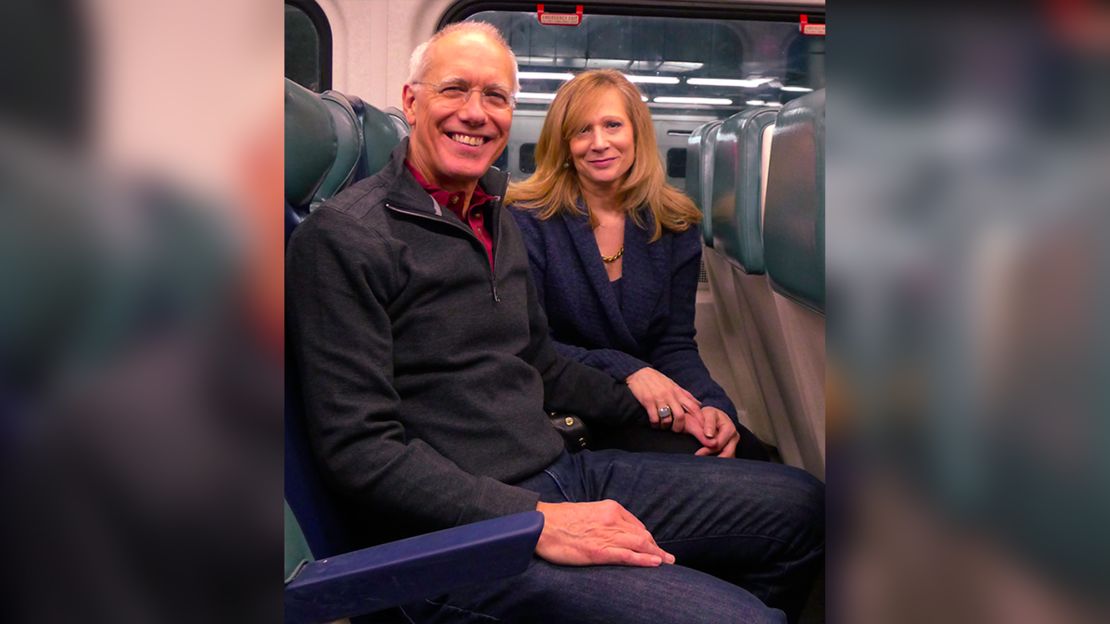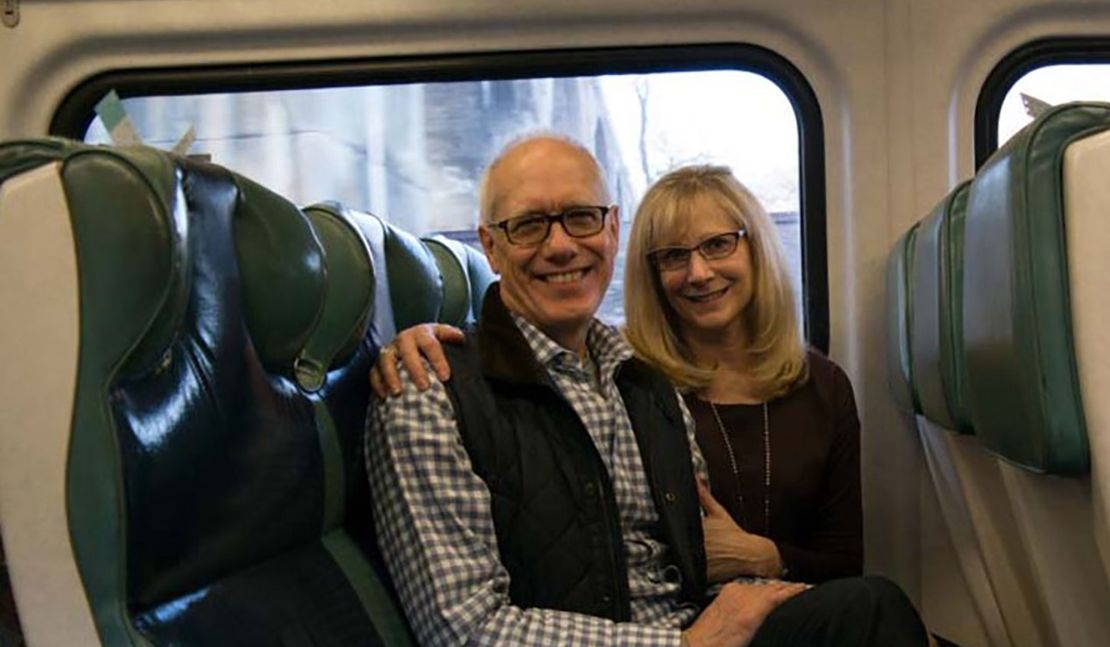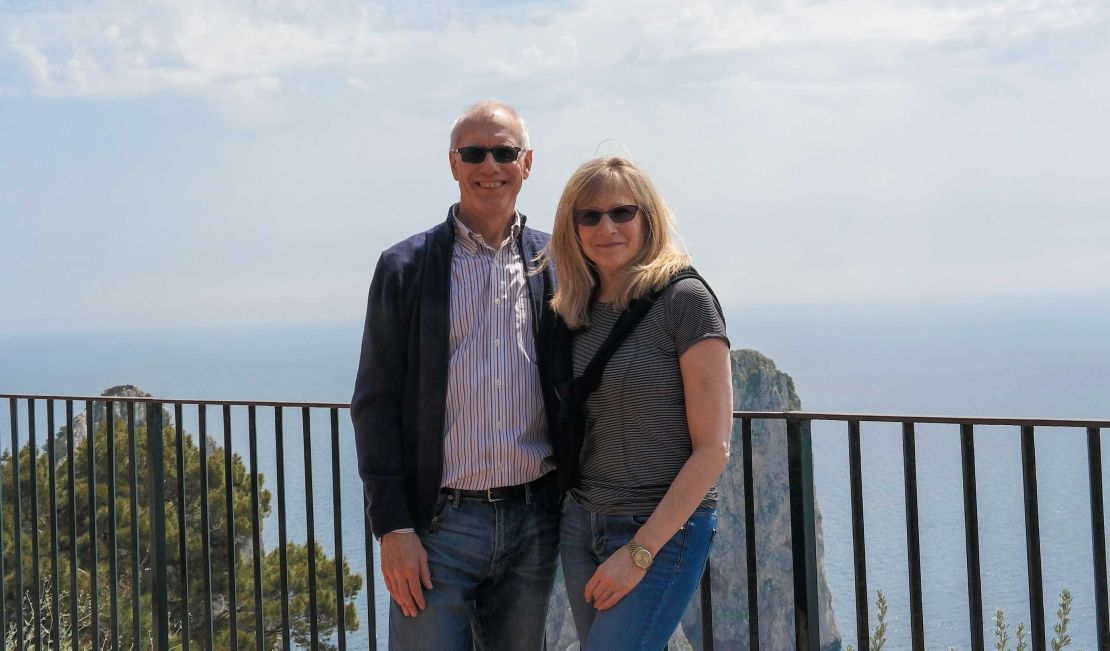On Christmas morning 2011, Linda Wenger boarded a Metro-North train from New York’s Grand Central Station to head upstate to Katonah.
She was in her mid-50s and had been divorced for 10 years. Her daughters always spent the holidays with her ex-husband – Wenger is Jewish, so she didn’t have much affiliation with Christmas, whereas her ex’s new partner celebrated the holiday.
Wenger’s sister’s family also celebrates Christmas, so she always traveled to their home in Connecticut on December 25. And she always traveled alone.
“I always found Christmas Day a little lonely, because I was never with my girls,” Wenger tells CNN Travel today.
Wenger had a very successful career in marketing for a nonprofit. She was content with her career and her life in New York.
But as the train pulled out of the Manhattan terminus, she found herself reflecting.
“I might have been a little wistful,” Wenger recalls.
There were only a handful of other people in Wenger’s carriage, including a man of a similar age, who was sat opposite.
She watched him pull out wallpaper and paint samples from a bag, spreading them on the table in front of him.
“I just got this good vibe from him,” recalls Wenger. “I thought, ‘He’s kind of cute. And he’s alone on Christmas Day.’”
She figured he’d probably sat opposite her to initiate a friendly conversation, yet he seemed pretty absorbed in his task.
As the city retreated into the distance, Wenger considered whether to strike up a chat.
Then the stranger pulled out a particular floral wallpaper.
“Oh, that’s William Morris, isn’t it?” she said, recognizing one of the intricate patterns that characterize the work of the Victorian artist.
The man looked up and smiled.
He was Michael McTwigan, a New Yorker in his early 60s who’d been separated from his wife for a year or so.
He was on his way to volunteer at a Christmas food drive in Katonah. His boss lived in that area, and had told him about the event, which aimed to feed some 300 people over the holiday.
“It was Christmas Day, and I thought, ‘Well, it’d be nice to do something and I’m all alone, so what can I do that’s helpful?’” McTwigan tells CNN Travel today.
He was passing the time on the train looking through wallpaper samples as a favor for a friend, who wanted a print that matched the paint color in her apartment. McTwigan, a former art critic with an aesthetic eye, had offered to help out.
When Wenger mentioned William Morris, McTwigan was surprised. He suggested she must have some artistic training to recognize the print.
Wenger explained she’d been an art history major at college. McTwigan told her about his art background, and added that he was now in marketing.
Wenger said she worked in marketing too, for a large lung cancer research charity. They started chatting about the joys, and pitfalls, of their shared profession.
As they talked about their lives and respective Christmas Day plans, the two realized they shared a love of art, similar careers and a drive to help others – Wenger through her job, and McTwigan through his volunteering.
“When he told me what he was doing, I said, ‘Oh my God, that’s got to be the best character reference I’ve ever had. Right? Somebody is going to do something so unselfish on Christmas Day,’” says Wenger.
McTwigan was just as taken with Wenger – he’d noticed that while she didn’t downplay her career, she talked more about her connections with people than her achievements.
He felt she was “very sensitive and intuitive.”
“Sensitive in the sense of being aware of other people’s feelings, or moods, or whatever, and open to understanding what other people are feeling,” he says now. “She put people first – somehow that was more important than anything else.”
Once the two had started talking, their conversation didn’t stop, and as the train rolled through the New York countryside, they realized they were enjoying one another’s company immensely.
“He had a very friendly and sweet vibe,” says Wenger. “And I thought, ‘OK, this is something.’ I felt something between us.”
The journey from Grand Central to Katonah takes just over an hour. In no time at all they were pulling into Katonah’s tiny platform, shrouded in trees.
As the train stopped, Wenger reached into her purse, and handed McTwigan her business card.
Then the two got off the train together, and walked down the station stairs to the ground level, where Wenger’s mother was waiting to pick her up.
Wenger and McTwigan went to shake hands to say goodbye. As their hands touched, McTwigan reached further up Wenger’s arm, and held it for a moment.
“Great to meet you,” he said, smiling.
Wenger calls the gesture “the sweetest thing.”
“I definitely had flutters from that,” she says now.
When Wenger got into her mother’s car – and later as she was chatting with her sister and the rest of her family – she shared what had happened on the train.
“I met this really interesting man,” she explained.
“Yeah, there was something going on between you,” said Wenger’s mother, laughing – she’d seen the lingering handshake from the car.
“I was kind of buzzing with excitement about it,” says Wenger.
McTwigan kept thinking about the train encounter too.
“I absolutely wanted to see Linda again,” he says. “There wasn’t a doubt in my mind about it.”
A first date in New York
Over the Christmas and New Year period, the two exchanged a handful of emails.
Then McTwigan asked if Wenger would like to meet when they were both back in the city. He suggested a live event in New York, run by storytelling group The Moth.
As real people stood on stage and told their stories, Wenger and McTwigan picked up their conversation right where it had left off at Katonah station.
They had a series of subsequent meet-ups in New York City. Some, they say, were more successful than others – a pop-up guitar concert suggested by McTwigan turned a little awkward when they realized the music was pretty experimental.
“We didn’t know each other well enough to say, ‘This is really horrible,’ right away,” says Wenger, laughing.
But afterwards the two went to Joe’s Pub in the East Village, where a jazz singer was serenading the crowd.
“We were laughing and dancing, and that broke the ice completely,” says Wenger.
They say they took their courtship day by day, and tried not to have any expectations.
They’d both been married before, and they were approaching falling in love again with both excitement and trepidation.
“‘Let’s just go slow and see how it goes, because after all, we know the perils of choosing wrong,’ was their mantra, says McTwigan.
“But especially as we had more experiences together, all the more of the similarities – the similar feelings and values – became clear to each of us, I think. We grew closer,” he adds.
“We were both happy together a lot, which was something we hadn’t had in a long time, both of us,” says Wenger. “A lot of happiness – that gets very addictive.”
The relationship just felt easy, they say, and that was also part of the appeal – they enjoyed spending time together and they loved one another’s friends and families.
A return trip

On Christmas Day 2012, the two boarded the Metro-North train from Grand Station to Katonah, just as they had the year before. But while 12 months previously they’d been strangers, now they were a couple, traveling together to visit Wenger’s family.
Rather than sitting opposite one another, they sat together, shoulder to shoulder.
They asked another passenger to take a photo, which sparked a tradition.
“Every year, getting on that train we would take a picture, or ask someone to take a picture,” says Wenger.
“Every year was like an anniversary, it was wonderful,” says McTwigan.
The two soon moved in together, Wenger crossing the East River from her Manhattan base to live with McTwigan in Brooklyn.
They were based in Brooklyn for six years, commuting each Christmas to Katonah, before moving to Connecticut in 2018.
They love the community in their new neighborhood, and enjoy afternoons gardening together. The only disadvantage is that when Christmas rolls around, the two don’t need to get the train to Wenger’s sister’s house anymore, as they’re close enough to drive.
“A Christmas miracle”

Wenger and McTwigan got married in July 2018, in their Connecticut home.
“We just kind of threw it together,” says Wenger, explaining that they seized a moment when Wenger’s eldest daughter, whose family lives abroad, was back in the US.
It was a relaxed, warm occasion, the two say. Friends and family crowded out the rooms of their home, eating smoked meat. One of McTwigan’s lifelong friends officiated the service.
“I think the thing we talked about afterwards was it just felt like an outpouring of love toward us,” says Wenger. “People were just so happy that we’d found each other. So it was a pretty wonderful day for us.”
In their vows, the two celebrated the “Christmas miracle” that brought them together – “a Christmas miracle for a Jewish girl,” as Wenger puts it.
“It’s such a crazy thing to meet somebody in such a random way that you have so much happiness, peace with, so much in common,” she says.
Everybody they know loves the story, she says.
“It was an unusual, chance encounter,” says McTwigan.
“But I mean, we didn’t meet in Paris,” adds Wenger, laughing. “We met on Metro-North, a commuter train. But it did the trick.”
10 years on

This Christmas marks 10 years since Wenger and McTwigan sat opposite one another on the train.
Unfortunately the two aren’t able to visit Wenger’s sister in Connecticut this year. The annual Christmas gathering was canceled on December 22, when Wenger’s niece tested positive for Covid-19.
Instead, Wenger and McTwigan will be celebrating together at home, just the two of them – eating all the appetizers they’d pre-prepared for the larger family gathering.
While they’ll miss their family, and the pandemic is a concern, the two say they love spending time in one another’s company, so they’ll make the most of the day together – as they do every day together, feeling grateful to have met one another, and taken a chance.
The two hope their story inspires people to be open to new experiences, and to seize moments that come their way, however unexpected.
“Always be ready to take an opportunity, because you never know where it will lead, some will pan out and some won’t, and that’s fine,” says McTwigan. “But you shouldn’t go through life with a narrow focus, but looking around you and taking in all this around you, and enjoying it – that’s my takeaway.”
“Yes, have an open heart,” says Wenger. “And also, I think a lot of people who are alone and don’t want to be alone can have a feeling that nothing’s going to change. And I went through a very long time of being alone.”
I always had an attitude that something could change, something good could happen and I wouldn’t be alone. And maybe that’s what made me the kind of person who would walk up to a stranger and ask a question, to make it happen […] I kept an open heart.”
Top photo courtesy Linda Wenger





